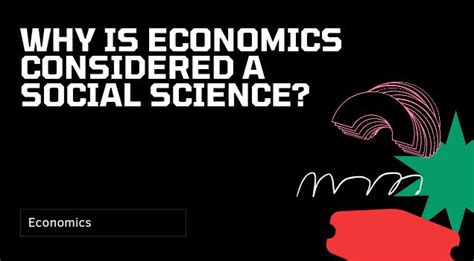Economics is the study of how individuals, societies, and governments allocate scarce resources to satisfy their wants and needs. It is considered a social science because it examines how human behavior and interactions affect the production, distribution, and consumption of goods and services.

Economics and Social Science
Social sciences explore various aspects of human society, including behavior, culture, and institutions. Economics, as a social science, focuses on the economic behavior of individuals and groups, as well as the structures and processes that govern economic activities.
Key Characteristics of Social Sciences
Social sciences share certain key characteristics:
- Focus on Human Behavior: They investigate human behavior and social interactions, including economic decisions.
- Empirical Research: They rely on data and evidence to support their theories and conclusions.
- Contextual Understanding: They consider the cultural, historical, and social context in which economic activities occur.
- Interdisciplinary Approach: They often draw insights from other disciplines, such as history, sociology, and psychology, to gain a comprehensive understanding of economic phenomena.
Economics as a Social Science
Economics fits the criteria of a social science in several ways:
- Human Behavior: Economics studies how individuals and groups make economic choices, considering factors such as preferences, incentives, and constraints.
- Empirical Research: Economic theories are tested using data from surveys, experiments, and statistical analysis.
- Contextual Understanding: Economic models consider the specific cultural, institutional, and technological contexts in which economic activities take place.
- Interdisciplinary Approach: Economics draws on insights from sociology, psychology, and political science to better understand economic behavior and decision-making.
Importance of Economics as a Social Science
Understanding economics as a social science is crucial because it:
- Provides insights into how human behavior influences economic outcomes.
- Helps policymakers design policies that promote economic growth and stability.
- Enhances our understanding of societal issues related to poverty, inequality, and market failures.
- Improves economic decision-making by considering social and cultural factors.
Examples of Economic Social Science Research
Examples of research in economics that demonstrate its social science nature include:
- Studies on the impact of social networks on economic opportunities.
- Analysis of the role of cultural norms in shaping economic behavior.
- Exploration of how psychological biases affect financial decision-making.
- Examination of the social and economic consequences of inequality.
Conclusion
Economics is considered a social science because it examines human behavior, relies on empirical research, considers contextual factors, and draws on interdisciplinary insights. This social science perspective enables economists to understand the complexities of economic decision-making, design policies that address societal issues, and contribute to a more informed and equitable economic system.
